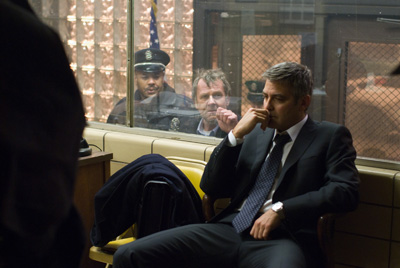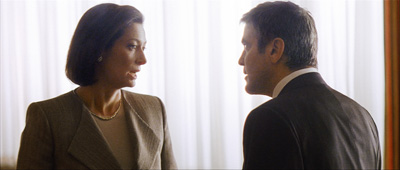George Clooney has built himself a pretty cool career by alternating fluffy summer fare with more serious, conscience provoking dramas. Michael Clayton is his latest excursion into the latter. It’s a tale about a lawsuit that hinges on the plaintiffs not finding out that the product in question was known to have potentially fatal effects on its users – sort of like the memos within the tobacco industry that acknowledged the addictive and cancer-causing aspects of their products.
It’s funny… when George Clooney does a summer type movie [the Ocean’s Eleven flicks, for example], there’s always something of a dramatic component to give weight to the fun. Unfortunately, when he takes on a film that Says Stuff, there’s usually very little humor to give the audience a break from all the portentousness.
Michael Clayton is no exception. The film opens with Clayton [Clooney] going about his day [a payoff here, a birthday party there, a janitorial gig elsewhere]] before driving out into the country. When he stops and gets out of his car to wander over to check out three really beautiful horses, his car explodes! Then we are taken back four days to watch him become involved in fixing a problem of immense proportion – the lead lawyer on a major litigation case, Arthur Edens [Tom Wilkinson] suddenly stripped down to his socks in a deposition and fled into the parking lot.
Clayton may have a reputation as a fixer, but he considers himself a janitor, and he seems like he’s long since lost any enthusiasm for his job. Complicating things are his relationship with his and the closing of a restaurant he opened with his addict brother – which leaves him $75,000 in the hole since his loyalty to family forces him to assume the debt. Even better, he has a week to pay.
Michael Clayton is all washed out greys and blacks, a palette that screams out Message Movie [or horror movie, but this time it’s the former]. There’s a head of legal for the defendant uNorth, maker of the fatally flawed agricultural product, Karen Crowder [Tilda Swinton], who blithely handles the press and her shareholders with a much rehearsed ease [we actually see her rehearsal as she prepares for day in juxtaposition with a press interview]. There’s the head of Clayton’s law firm, Marty Bach [Sydney Pollack] who wonders why everybody can’t just get along and get this thing over.
Finally, there are Don Ellis [Ken Howard], whose signature is on the fatal memo, and Edens, who may simply gone off his meds [he’s manic-depressive], or suddenly developed a conscience. Edens’ meltdown will inevitably be compared to Peter Finch’s distraught newsman in Network and there’s some basis for that. With Edens, though, we get to see the whole thing on a digital recording that both puts distance between him and us, and simultaneously makes the whole thing more intimate – and therefore oddly compelling.
Tony Gilroy, who also wrote the script, directs Michael Clayton as something of an inexorable juggernaut that spurns its twists and subplots to some degree in order to take us from point A to point Z at a deliberate, almost stately pace, that ensures that we have ample time to assimilate the details of the legal case and the characters of those involved as the tale progresses. The problem is that in developing his characters and concentrating on the key points of the legal situation, he has inadvertently allowed for a few gaps in logic.
He hangs a lantern on the most obvious one by having Clayton call our attention to it – why did Crowder authorize the attempt on his life? As he says, “I’m not the one that you kill! I’m the one that you buy!” It’s a case of needing the bad guys to do something stupid in order for the nominal good guy to change his position and take on the big boys. It also makes no real sense – especially since Clayton’s rep is as a fixer, as Crowder would know if she took even five minutes to do a little research.
The other gaps aren’t as obvious, but combined with complete lack of anything even remotely resembling comic relief [in all these characters, there isn’t one who has a sense of humor?], the result is to take what is almost a perfectly executed legal thriller and turn it into one that is merely above average. On the whole, Michael Clayton works in terms of the legal situation – every character involved is played with a ruthless integrity: Crowder isn’t just focused to the point of near insanity, she really works at it; Edens isn’t just a wackadoo with a conscience, he’s the heart of the film.
This may be George Clooney’s finest dramatic performance. Clayton may have a job that requires him to be amoral, but he loves his son and takes on the financial burden caused by his brother because family means something to him. That his worldview needs to become more like his personal life is readily apparent and Clooney makes us believe the shift when it comes. He also gets some great lines [like those climactic assertions on who he is] – wry, even if they aren’t necessarily funny.
Michael Clayton is a good film that misses being great by the proverbial hair.
Final Grade: B+




“Michael Clayton” is the character study of a man who is very alone and his life is in shambles. His job at a large NYC law firm is to ‘fix’ things quickly when they go wrong. Be sure to shut off your GD cell phone so that you can pay attention to what’s happening on the screen. Good peformances and
photography.
GRADE = “A-“